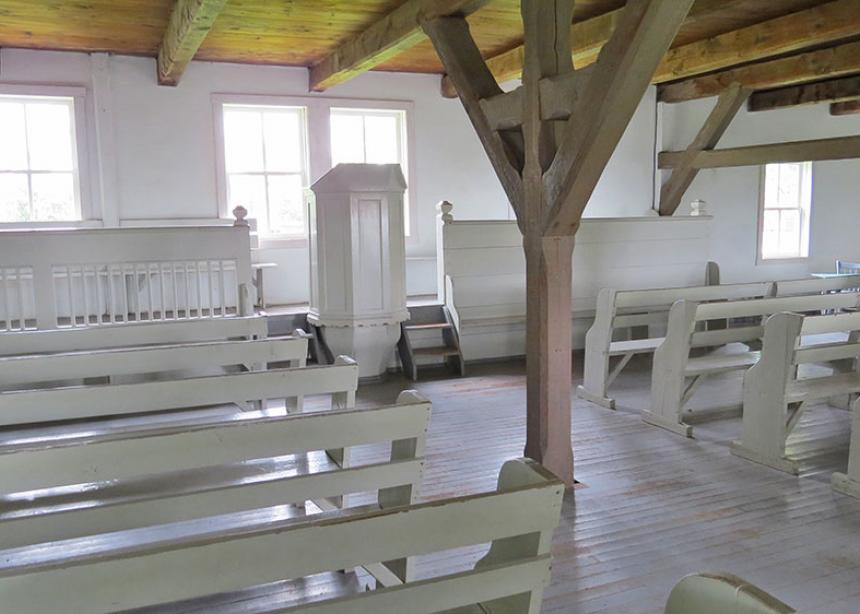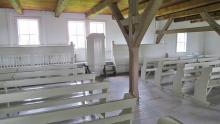My grandmother’s church is, like all Old Order Mennonite churches, plain. The white walls are bare. There are no stained-glass windows, no gilded altars and no images of saints or martyrs. Pews of hard, blonde oak sit in tight rows on worn linoleum.
Today, the small chapel is filled with people. Women, unadorned, wearing simple, modest dresses, their long hair tucked under black caps, sit with their daughters on one side. Men and boys sit across the aisle. A man sporting a beard, and wearing a black suit and white dress shirt stands behind the pulpit and preaches off the cuff. (No notes are required with God’s inspiration.) The sermon sounds like a throwback from a different age, focussed on the “evil one,” the reality of hell fire and the importance of vigilance against temptation.
Most of the people around me are my relatives. I sit with one of my mother’s brothers on my left, his son to my right. I sit with family and with the deep sense of connection hoped for in family. I sit with belonging.
I also sit as an outsider. I am, for lack of a better word, an atheist.
I am home for a family reunion. My mother and her seven siblings, their spouses, children and grandchildren gather around the matriarch, my grandmother, who is closing in on 100, and who is watching and smiling in the midst of all that has come after her. We’re here from all over. I have come from British Columbia. There are others from B.C., too, aunts and uncles from Alberta and Minnesota, cousins from Kansas, New York and other parts of Canada and the U.S.
And, of course, most come from their homes right here in southern Manitoba, where our ancestors settled in the late 1800s. This is a rare, nearly complete gathering of the clan. A meal of fried chicken, another of vereneki (stuffed dumplings) and farmer sausage; a baseball game; the trip to church; shared stories interspersed with emotional greetings, hugs and tears, and laughter. It is good to be home.
According to my mother, my grandmother has wondered why she is still alive, why God hasn’t yet taken her to heaven. Her conclusion: He needs her to be here to pray for her family.
I imagine myself at the top of her list. I would like to be there, to be in her thoughts, but I know if I do top the list it is because I am seen as the most in need of prayer, the furthest of my family from Mennonite beliefs and traditions. This is one of many dichotomies that tease my brain. Where do I fit into my own community when the community is inseparable from the beliefs I have rejected?
The a cappella harmonies of the hymns sung by the small group of women and men at the front of the chapel are hauntingly beautiful. A chill runs up my spine as I listen to voices that are simulta-neously alien and familiar. This sect of Mennonites shuns musical instruments—as well as things like radios, televisions, photographs and fashion—a practice that until recently seemed to me archaic and meaningless. I now better understand it as one of the requirements of more harrowing times and an important reminder of a deep, dramatic history.
Nearly 500 years ago, a Catholic priest from the Netherlands named Menno Simons, who had been questioning church practices and re-thinking his own beliefs, joined the Anabaptist movement after his brother, who was part of the movement, was killed. The Anabaptist beliefs in believer’s baptism, the freedom to choose church membership, and the separation of church and state were a threat to Protestants and Catholics alike.
The resulting persecution left most of the movement’s leadership dead and its followers scattered and disorganized. Menno was soon a leader in the community, organizing many of those who remained and embracing the pacifist principles that helped his group survive, since those who stood their ground and fought, died. Out of this struggle, the Mennonites emerged.
A central theme in Mennonite history has been the necessity of movement, of seeking refuge in places where they would be allowed to practise their religious beliefs undisturbed. These sanctuaries have never been permanent, as governments have shifted from inviting them when labour was in short supply, to expelling them or revoking exemptions from military service or other expectations when the economic or political landscape changed.
As a result, Mennonites are a diasporic population, strewn across Europe and the Americas. Even after immigrating to Canada, when the government insisted all children attend public school, a small group of Mennonites moved yet again, leaving for South America, recognizing that this policy would eventually result in their assimilation.
One more time, Mennonites chose freedom over comfort and movement over conflict. Their actions were prophetic. My ancestors remained and I am the product of that assimilation, “passing” into mainstream Canada, embracing an evidence-based view of the world and its problems, spending my Sundays not in church but more likely watching reruns on TV and eating sushi.
Over the course of five centuries, a unique culture developed:
- A culture seen in its food influenced by Germany, Ukraine, Canada, Paraguay and many other regions, but also by necessity; food that is basic, evolved from meagre rations and long winters.
- A culture that values simplicity, community, family and the freedom of belief.
- A culture that rejects other attachments and is ready to move and adapt.
- A culture of pacifism and a willingness to help those trying to survive on the edges of our global community.
I have long accepted these identifiers as founded in Christianity. It seems clear to me now, however, that these traditions and values are founded in shared history, driven not by religious belief but by the responses these beliefs evoked from the societies Mennonites encountered along the way.
As I age I discover the importance of this history and how much it has created and continues to shape who I am. The story I have had of myself as independent and self-determining has all but disappeared.
I also see that dominant Canadian culture has less of a hold on me than I have even recently imagined. I may have completely rejected my family’s religion, but somehow the culture—the important bits, the values that have guided and shaped this unique religious group—is inside my bones, mixed into my marrow, not embraced by me but embracing me from the inside out.
There is no way around it, whether I like it or not. Any remnants of what I would call magical thinking—the metaphysical beliefs of Christianity—fell off me long ago without ceremony, like a blanket slipping from my shoulders. But the values and the cultural connections show up in me more every year, oozing up into my consciousness, each new morsel a pleasant revelation reminding me of my intimate tie to this community.
I live in a small apartment and increasingly find myself rejecting material attachments. I work at a college and the courses I teach focus on family, community social services and social justice. I thought I was brought to this work by my own autonomous choices, but I now realize how far that is from the truth.
My son wants to play military-themed video games. I am repulsed. Like any parent? Or like a Mennonite parent? I’m not sure.
When friends describe characteristics they see in me, more often than not I am surprised by how much those characteristics, at least the good ones, mirror what I see in that strange, distant, shrugged-off culture.
Outside the chapel after the service, my uncle embraces me. He puts his forehead to mine, breathes in deeply and without words tells me I am loved. He, his children and grandchildren belong to my grandmother’s church, the most traditional church in this community. On the outside, other than the hairline and bulb on the end of the nose, we couldn’t be more different. But we share the same marrow.
I am an atheist. I am also a Mennonite.
Robin Fast is an instructor in community, family and child studies at Camosun College in Victoria, B.C.
On the topic of Mennonite identity, see also:
Growing Mennonite
‘Interaction/Isolation’
Our neo-Anabaptists
For discussion
1. Have you experienced a loving “welcome home” after a time away? What contributed to the feelings of love and being embraced? What things inhibited a feeling of being welcomed and at home? How is a visit home different from a return home?
2. Robin Fast asks, “Where do I fit into my own community when the community is inseparable from the beliefs I have rejected?” Is there room in a church community for someone who does not share the faith? Can “Mennonite” refer to culture, separate from faith?
3. Fast describes his grandmother’s church as a group separate from the world. How important is that sense of separateness for developing a distinctive family culture? What are the advantages and pitfalls of strong separation from the world? Will Fast’s children be able to experience a similar sense of homecoming?
4. How much do our congregations foster a Mennonite in-group mentality? Is it important to work at welcoming those without family connections into our congregations? How do you interpret Jesus’ story of the great banquet (Luke 14:15-24)?
—By Barb Draper




Comments
A great article. I often have the same experiences at family reunions, where I reunite with my conservative covering, cape-dressed cousins. I've officially joined the Catholic Church, and my parents haven't been any kind of conservative since the '70s, but there is something in my core that still exudes that Mennonite-cultural experience. I liken it to my Jewish friends, who may be athiests, or have converted to some version of Christianity, but in their core, they are still Jewish in 'culture.' Our experiences as children, our long, long family memory and experience has shaped our world view. There is that crazy feeling I get, like when I was in a train station in Chicago, and surrounded by conservative mennonite-amish, to strike up a conversation, and play the menno-game, like my grandmother would. But, I know, das ist verboten. Because as far as they are concerned. I'm English.
I am not a former Mennonite, but a former Catholic and can relate very well to this post. I was a very devout child, teen and young adult. I spent time in a monastery in my late teens and early 20's, later left the Roman Catholic Church for a more welcoming Old Catholic Church and was ordained a priest with that jurisdiction. After 10+ years of active ministry I began to loose my faith as well. I was honest about it and requested my bishop remove me from active ministry and now pretty much consider myself an agnostic, with some slight deist leanings at times. But like the writer, it has affected me in many good ways. My religious community was Franciscan, based on the teachings of Francis of Assisi, with great emphasis on service to the poor and needy. It also has a very strong peace and justice strain going through it as well. Today I still look at the world through the eyes of the young, idealistic Franciscan brother. And I, like the writer here, find that background has made me a better person.
Sorry Robin, but I cannot agree with you. You are not a Mennonite. You are a person shaped by the culture of a Mennonite religious community, but that does not make you a Mennonite. You are a Mennonite when you have accepted believer's baptism and are a member of a Mennonite Church. Nice try.
John Reimer
Sorry Mr. Reimer, but I don't believe Robin is "trying to be mennonite". Some of us who have gone through change, even tried to escape, or move on, find ourselves unable to stop being Mennonite as Robin so eloquently described. If Robin wants to call himself a Mennonite because of his cultural upbringing - just as an atheist Jew can still identify as Jewish - who are you to deny him that?
You are entitled to your definition of what a Mennonite is and isn't. But I find your attitude of cutting Robin off from a community he still identifies with not very generous. But then excommunication is part of Mennonite heritage- or is that just the Amish?
She is clearly not talking about Old Order Mennonites, but some variation of Old Colony Mennonites. The picture looks like it's from the Steinbach museum. Otherwise it's an engaging piece that shows how blurry the concept of "Mennonite" can be. It's both a choice and a heritage.
I too am a former Mennonite and an atheist. I value deeply the strong Mennonite community of faith. I am a part of a strong faith community. Faith is about choosing to live according to the core value of loving your neighbor as yourself even though you can't prove that living that way is the "right way" to live. We can see the manifestation of true faith in the way we live and that faith isn't well correlated with willingness to make belief statements. Faith isn't about willingness to say that you believe things that can't be proven. For me to make belief statements, I would have to be dishonest and that would be inconsistent with my faith values. Communities of faith can welcome those who are honestly seeking guidance for how to live and be in community.
"But you can't take the Mennonite out of the boy." Is that how the saying goes? Thank you so very much for your post; it resonated in so many ways, including having a son who plays shooting-based video games. I have not been religiously Mennonite for over 20 years, but all of my family is still Pennsylvania Dutch Mennonite, including my husband's family. I have tried to think of myself as Ex-Mennonite, Post-Mennonite, Formerly Mennonite. But truly, all labels fail for me. When people ask me if I'm Mennonite, I say, "I grew up Mennonite." When I've replied, "I left the Mennonites," it feels painful and not even quite true. Even though I do not agree with their theology, I have certainly not left them in my heart. Though it is complex. Our son is not being raised in the community, and that is a big departure. I wrote my book, "Crazy Quilt: Pieces of a Mennonite Life," trying to get at the difficulty of this juxtaposition between leaving and still loving the deep roots that birthed and formed me. I am re-writing it, trying to explore & articulate this even more thoroughly. I'm sure this topic has enough to fill Proust-like volumes. I hope you write more on this subject. There aren't a lot of Mennonite writers standing at the place we stand and articulating that experience. Though it is a very common experience, to find oneself outside of one's tribe, as the "former believer" commenter already suggested. Early on I read Chaim Potok's "The Gift of Asher Lev" and it was so very helpful to read about the conflicts between art, personal expression & what it means to leave an orthodox community. I hope in time we'll have our own cluster of Mennonite authors who describe their experience of difference & separation honestly --and with the kind of self-reflection you're doing.
I am not Mennonite but I find a common experience in my own culture. I think
"Mennonite " is not only a particular religious faith but an even deeper
"Cultural " lifestyle. I am formerly of a Christian protestant background. I have rejected the religious teaching of my youth. Still,regardless of our particular "brand of religion " I am part of a Christian culture as I believe we all are that live here in North America ..........
John,
Thanks for reminding me why I (just as Robin) am no longer involved with the Mennonite church. And I am a Mennonite, just one who also happens to be an atheist and not to concerned with policing the borders and checking on purity tests. Like it or not Mennonite also functions as a cultural identity.
I grew up near Altona, Manitoba in a very Mennonite household. I consider myself a believer in God, although I have not been baptised, nor do I go to church on a regular basis. I am definitely Mennonite. I think God has many names ( or no name, like the Bible tells us). If I truly believe in the word of god, I believe in Jesus teachings, and his main message was " Love one another", not " judge one another". To truly live in peace, as Mennonites believe, it's important to remember the core of Jesus teaching.
Pages
Add new comment
Canadian Mennonite invites comments and encourages constructive discussion about our content. Actual full names (first and last) are required. Comments are moderated and may be edited. They will not appear online until approved and will be posted during business hours. Some comments may be reproduced in print.